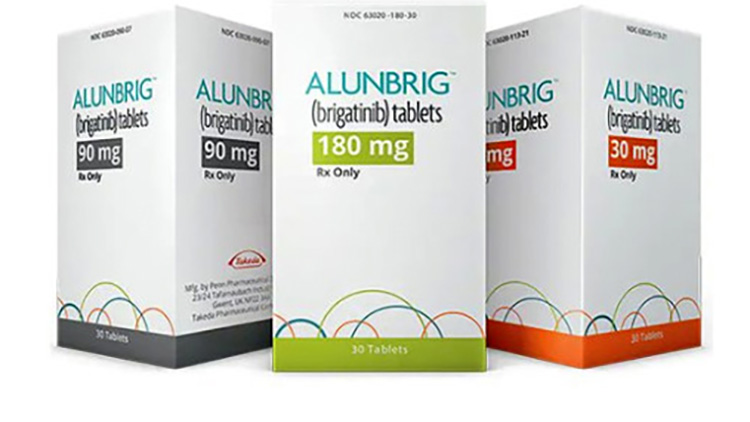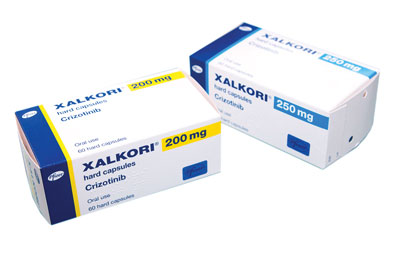Alunbrig (brigatinib) vs Xalkori (crizotinib)
Alunbrig (brigatinib) vs Xalkori (crizotinib)
Alunbrig (brigatinib) and Xalkori (crizotinib) are both targeted therapies used to treat non-small cell lung cancer (NSCLC) with specific genetic alterations, but they differ in their specificity and indications. Alunbrig is specifically designed to inhibit ALK (anaplastic lymphoma kinase) and is typically used for patients who have progressed on or are intolerant to crizotinib, offering a potential treatment option for those with acquired resistance. In contrast, Xalkori was the first ALK inhibitor approved for the treatment of ALK-positive NSCLC and is often used as a first-line therapy, but patients may develop resistance over time, at which point a drug like Alunbrig might be considered. Patients should consult with their healthcare provider to determine the most appropriate treatment based on their individual medical history, the specific characteristics of their cancer, and the safety and efficacy profile of each medication.
Difference between Alunbrig and Xalkori
| Metric | Alunbrig (brigatinib) | Xalkori (crizotinib) |
|---|---|---|
| Generic name | Brigatinib | Crizotinib |
| Indications | ALK-positive metastatic non-small cell lung cancer (NSCLC) | ALK or ROS1-positive metastatic NSCLC |
| Mechanism of action | ALK and EGFR inhibitor | ALK, MET, and ROS1 inhibitor |
| Brand names | Alunbrig | Xalkori |
| Administrative route | Oral | Oral |
| Side effects | Nausea, diarrhea, fatigue, cough, headache | Visual problems, nausea, diarrhea, vomiting, edema |
| Contraindications | Hypersensitivity to brigatinib | Hypersensitivity to crizotinib |
| Drug class | Tyrosine kinase inhibitor | Tyrosine kinase inhibitor |
| Manufacturer | Takeda Pharmaceutical Company | Pfizer Inc. |
Efficacy
Alunbrig (brigatinib) Efficacy in Lung Cancer
Alunbrig (brigatinib) is a targeted therapy approved by the U.S. Food and Drug Administration (FDA) for the treatment of non-small cell lung cancer (NSCLC) with a specific genetic mutation. This medication is designed to inhibit anaplastic lymphoma kinase (ALK), which can drive the growth of cancer cells in individuals with ALK-positive NSCLC. Clinical trials have demonstrated that brigatinib is effective in treating patients with ALK-positive metastatic NSCLC who have progressed on or are intolerant to crizotinib. In these studies, brigatinib has shown a high objective response rate, meaning that a significant proportion of patients experienced a reduction in their tumor size.
In the pivotal phase 2 trial known as ALTA, patients treated with brigatinib after crizotinib failure showed a confirmed objective response rate of 53% with the 90 mg once-daily regimen and 67% with the 180 mg once-daily regimen following a 7-day lead-in at 90 mg. Moreover, brigatinib has also demonstrated a durable response, with a median progression-free survival (PFS) of 16.7 months for the 180 mg regimen. These results suggest that brigatinib is a highly effective second-line treatment for patients with ALK-positive NSCLC.
Xalkori (crizotinib) Efficacy in Lung Cancer
Xalkori (crizotinib) is another ALK inhibitor that has been a cornerstone in the treatment of ALK-positive NSCLC. Crizotinib was the first ALK inhibitor approved by the FDA for this indication and has shown significant efficacy in shrinking tumors in patients with this type of lung cancer. In clinical trials, crizotinib has been associated with high response rates in patients with advanced ALK-positive NSCLC, with an objective response rate of approximately 65-74%. Additionally, crizotinib has been shown to improve PFS when compared to standard chemotherapy regimens.
Despite the effectiveness of crizotinib, resistance to the drug often develops, leading to disease progression. In such cases, second-generation ALK inhibitors like brigatinib are considered for subsequent treatment. The PROFILE 1014 trial, which compared crizotinib to chemotherapy in previously untreated advanced ALK-positive NSCLC, showed a median PFS of 10.9 months for patients treated with crizotinib. This data underscores the role of crizotinib as a first-line treatment option, providing a significant improvement over chemotherapy for patients with ALK-positive NSCLC.
Regulatory Agency Approvals
Alunbrig
-
European Medical Agency (EMA), European Union

-
Food and Drug Administration (FDA), USA

-
Pharmaceuticals and Medical Devices Agency (PMDA), Japan

Xalkori
-
European Medical Agency (EMA), European Union

-
Food and Drug Administration (FDA), USA

-
Health Canada

-
Pharmaceuticals and Medical Devices Agency (PMDA), Japan

-
Therapeutic Goods Administration (TGA), Australia

Access Alunbrig or Xalkori today
If Alunbrig or Xalkori are not approved or available in your country (e.g. due to supply issues), you can access them via Everyone.org.
How it works

Make an enquiry
Choose the medicine you want to buy, answer a couple of questions, and upload your prescription to speed things up. We’ll get back to you within 24 hours.


Make an enquiry
Choose the medicine you want to buy, answer a couple of questions, and upload your prescription to speed things up. We’ll get back to you within 24 hours.


Breeze through the paperwork
We'll guide you through the required documents for importing unapproved medicine, ensuring you have all the necessary information.


Get a personalized quote
We’ll prepare a quote for you, including medicine costs and any shipping, administrative, or import fees that may apply.


Receive your medicine
Accept the quote and we’ll handle the rest - sourcing and safely delivering your medicine.

Some text on this page has been automatically generated. Speak to your physician before you start a new treatment or medication.
Let's talk
If you have any questions, call us or send us a message through WhatsApp or email:
Contact us




